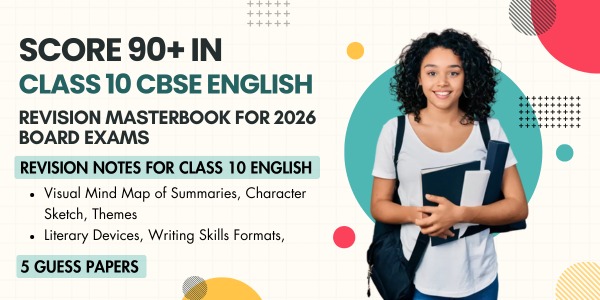CBSE Class 10 First Flight Book Chapter 2 Nelson Mandela Long Walk to Freedom Question Answers from previous years question papers (2019-2025)
Nelson Mandela Long Walk to Freedom Previous Year Questions with Answers – Question Answers from Previous years Board Exam Question papers provide valuable insights into how chapters are typically presented in exams. They are essential for preparing for the CBSE Board Exams, serving as a valuable resource.They can reveal the types of questions commonly asked and highlight the key concepts that require more attention. In this post, we have shared Previous Year Questions for Class 10 English Chapter 2, “Nelson Mandela Long Walk to Freedom”.
Questions from the Chapter in 2025 Board Exams
Q1. Why, according to Mandela, was it important to learn to hate? (Nelson Mandela: Long Walk to Freedom) [40-50 words]
Ans. According to Mandela, love comes naturally to the human heart while he is taught to hate. He says that it is important to learn to hate because once one learns to hate, one can be easily taught to love. Love comes naturally to the human heart. A heart that can hate will easily learn to love.
Q2. Both ‘Nelson Mandela: Long Walk to Freedom’ by Nelson Mandela and ‘The Trees’ by Adrienne Rich explore themes of transformation, Liberation and the power to change. Examine the commonality of themes in both the works. [100-120 words]
Ans. The themes of transformation, liberation and power to change can be seen in both these compositions.
Nelson Mandela tells us how his involvement in the country’s freedom struggle transformed a law-abiding attorney to become a criminal, that turned a family-loving husband into a man without a home, that forced a life-loving man to live like a monk. In the poem also, we see a transformation in the trees which are moving out of the house and are desperate to go out. Liberation is the key theme in Mandela’s story. Their struggle was primarily to gain freedom and equality for their countrymen. In the poem, the trees symbolically represent females who are seeking freedom from the shackles of the patriarchal society. ‘Going out’ indicates their quest for liberty. Both the compositions show that change can be brought about only through perseverance and courage. Mandela sacrificed his family and his life for the cause that he fought for. The trees also shuffled and stifled to finally break the windows, crack the walls and move out of the walls.
Both the compositions highlight the required qualities for bringing a transformation. To gain liberation from any type of binding, one has to undergo a lot of struggle.
For All Class 10 English Lesson Explanation, summary, Character Sketch, MCQs and Previous Years Question Papers Click here
Q3. Comment on the reactions and feelings of Lencho and Nelson Mandela when they faced challenges in their lives. (A Letter to God and Nelson Mandela: Long Walk to Freedom) [100-120 words]
Ans. Both the characters of Lencho and Nelson Mandela teach us to be patient and determined in tough times. These men worked to achieve their target and did not give up in time of adversity. We get to learn that once we stand up for a cause, then there should be no looking back. One has to remain undettered till the goal is achieved.
Lencho’s character also teaches us the power of faith. He is not shaken by nature’s fury because he believes that God is there to help him. We learn that having faith in God is like a powerful weapon which comes into force when all other weapons fail. The character of Mandela teaches us the importance of hope. For thirty long years, he served imprisonment with the hope that one day he would get equality and justice for his people.
Thus, hope and faith are the two essential pillars or attributes that enable men to achieve the unachieveable.
Questions which came in 2024 Board Exam
Q1. Read the extract given below and answer the questions that follow:
On the day of the inauguration, I was overwhelmed with a sense of history. In the first decade of the 20th century a few years after the bitter Anglo-Boer war and before my own birth, the white skinned people of South Africa patched up their differences and created a system of racial domination against the dark-skinned people of their own land. The structure they created formed the basis of one of the harshest, most inhumane societies the world has ever known. Now, in the last decade of the twentieth century, and my own eighth decade as a man, that system has been overturned forever and replaced by one that recognised the rights and freedoms of all peoples, regardless of the colour of their skin. [2024]
(i) Explain the feelings of the narrator when he said ; “I was overwhelmed with a sense of history.”
Ans. His mind was full of the happenings of the past, the struggle that they went through to make the day a reality.
(ii) The system of racial domination has been replaced by a system that:
(A) confirms the education of the Blacks.
(B) recognises the rights and freedoms of all people.
(C) recollects the bitter experiences.
(D) focuses on the personality development.
Ans. (B) recognises the rights and freedoms of all people.
(iii) Comment on the kind of society apartheid had created.
Ans. A Harsh and inhumane society had been created.
(iv) Which phrase would correctly substitute ‘patched up’ in the given sentence from the extract:
“….the white skinned people of South Africa patched up their differences…”
Ans. repaired
Q2. Read the extract given below and answer the questions that follow:
Tenth May dawned bright and clear. For the past few days, I had been pleasantly besieged by dignitaries and world leaders who were coming to pay their respects before the inauguration. The inauguration would be the largest gathering ever of international leaders on South African soil. The ceremonies took place in the lovely sandstone amphitheatre formed by the Union buildings in Pretoria. For decades this had been the seat of white supremacy, and now it was the site of rainbow gathering of different colours and nations for the installation of South Africa’s first democratic non-racial government.
(Nelson Mandela — Long Walk to Freedom) [2024]
(i) What do you infer from the following statement?
“The inauguration would be the largest gathering ever of international leaders on South African Soil.”
Ans. For the first time in the history of South Africa, the ceremony was attended by the maximum number of dignitaries from all around the world.
(ii) Explain in about 40 words the effective shift from white supremacy to a rainbow gathering.
Ans. Before that day of inauguration, South Africa was being ruled by the Whites and the Black population was subjected to a system of discrimination called Apartheid. The entire world had delinked itself from the country. But on that day, as a mark of solidarity with the people, world leaders had arrived in South Africa for the ceremony. Thus, there was a shift from the white supremacy to a gathering of rainbow colours.
(iii) Which phrase would correctly substitute ‘pleasantly besieged’ in the given sentence from that extract?
Ans. delightful to be surrounded by
(iv) State true or false with reference to the given extract.
In the past the ‘amphitheatre’ had been a seat for theatrical performances.
Ans. False
Q3. Read the extract given below and answer the questions that follow:
We have, at last, achieved our political emancipation. We pledge ourselves to liberate all our people from the continuing bondage of poverty, deprivation, suffering, gender and other discrimination.
Never, never, and never again shall it be that this beautiful land will again experience the oppression of one by another.
The sun shall never set on so glorious a human achievement.
Let freedom reign. God bless Africa!
(Nelson Mandela — Long Walk to Freedom) [2024]
(i) ‘State any one inference about Nelson Mandela from the given context:
“We have, at last, achieved our political emancipation.”
Ans. He wanted the political freedom of the entire population of South Africa.
(ii) State True or False :
When Mandela says, “God bless Africa”, he intends to mean well-being and welfare of only black people in South Africa.
Ans. False
(iii) “Nelson Mandela’s speech is full of optimism.” Elaborate in about 40 words with reference to the extract.
Ans. His speech shows his positive attitude when he says that the land will never again face such oppression. The people of the country shall live free forever. He also vows to free the populace from the shackles of poverty, suffering and discrimination.
(iv) Which phrase would correctly substitute ‘so glorious’, in the given sentence from the extract.
“The sun shall never set on so glorious a human achievement.”
Ans. “The sun shall never set on such a glorious human achievement.”
Q4. Nelson Mandela in his inauguration speech says, “We, who were outlaws not so long ago, have today been given the rare privilege to be host to the nations of the world on our own soil.”
What is the significance of this statement with reference to the political system that prevailed before this? [2024, 40-50 words]
Ans. Earlier, the White supremacy in South Africa had founded a system of supremacy and people like Mandela who fought for the freedom of the masses were considered outlaws and were punished. However, with the end of that system, now a democratic government was being set up and thus, these freedom fighters were now considered as the harbingers of this freedom. Thus, now these so called outlaws became the frontrunners of the nation who were hosting the world leaders on the occasion of the swearing-in ceremony.
Q5. In the chapter ‘A Baker from Goa’ the narrator talks about his childhood in Goa and his fond memories. In about 120 words write a presentation draft comparing the childhood of the narrator in ‘A Baker from Goa’ to that of Nelson Mandela.
You may begin this way:
Childhood memories remind us of the days gone by…..
Reference : A Baker from Goa and Nelson Mandela : Long Walk [2024, 120 words]
Ans. Childhood memories remind us of the days gone by. The author of the story A Baker from Goa reminisces the good old days when he lived in Goa. He elaborates ablout the lazy mornings when they would meet the baker who visited twice a day to sell baked goods. The kids would look for the favourite bread bangles, eat them without brushing their teeth. The entire story is filled with nostalgia where we get to know the importance of a baker in Goan households. The baker was like a friend, companion and guide to the narrator. He also throws light on the significance of baked items in Goan culture which makes the baker an essential part of the community. Thus, the narrator shares sweet memories of his childhood.
Nelson Mandela’s childhood was also full of freedom. He was free to do whatever he wished for. Like run in the fields, swim in the stream, roast mealies under the night sky and ride the bulls. He also has sweet memories of his childhood when he enjoyed the freedom to do follow his heart. All he was expected was to obey his father and follow the rules of his tribe.
Thus, we notice that both of them are nostalgic about their childhood. They miss the good old days when they had a carefree life.
Q6. A desire is more personal whereas a vision has broader connotations. You have been asked to present an analysis of Valli’s desire and Mandela’s vision and how they are respectively fulfilled. Write this presentation draft including your insights, in about 120 words, comparing the approaches of both Valli and Mandela.
You may begin like this :
One acknowledges that both, Valli and Mandela however, (Reference — Nelson Mandela — A Long Walk to Freedom & Madam Rides a Bus) [2024, 120 words]
Ans. One acknowledges that both Valli and Mandela were able to achieve their goals. Valli had a desire to go on a bus ride. Being a mature girl, Valli left no stone unturned to undergo a successful outing. The readers are in awe of her wisdom, gracefulness and intelligence which helped her gather all information about the trip, make the necessary arrangements for the bus ride and also, make a safe bus journey and return home securely. Thus, she was able to fulfil her dream.
Nelson Mandela envisioned a free populace in his country. He wanted justice and equality for the people of the nation. His vision was beyond personal desires and he felt pain for all the countrymen. He struggled for a long period of almost thirty years in order to end racial discrimination and set up the first democratic government in the country. His persistence is an inspiration for us. The readers get to know that the real diamonds of the country are the numerous freedom fighters whose struggle finally made the country free.
Thus, we see that both the characters display strong qualities that helped them in their endeavours. A strong character is the foundation of success.
Questions from the Chapter in 2023 Board Exams
Q1. Read the extract given below and answer the questions that follow:
To the assembled guests and the watching world, I said : Today, all of us do, by our presence here ….. confer glory and hope to newborn liberty. Out of the experience of an extraordinary human disaster that lasted too long, must be born a society of which all humanity will be proud. We who were outlaws not so long ago, have today been given the rare privilege to be host to the nations of the world on our own soil. We thank all our distinguished international guests for having come to take possession with the people of our country of what is after all, a common victory for justice, for peace, for human dignity. [2023]
(i) A society that ________ was born out of human disaster.
(a) all humanity would be proud of
(b) was full of extraordinary human disaster
(c) was full of outlaws and fighters
(d) hosts nations on their soil
Ans. (a)
(ii) The former outlaws were given the privilege of _________.
(a) getting citizenship of their country
(b) participating in a trade conclave
(c) finalizing the foreign policy
(d) hosting the nations of the world on their soil
Ans. (d)
(iii) The speaker was overwhelmed with the sense of _______.
(a) gratitude (b) achievement
(c) happiness (d) charity
Ans. (a)
(iv) State whether the following statement is True or False :
The common victory was when South Africa did not become an independent nation.
Ans. False
(v) The noun form of the word ‘confer’ is
(a) conferring (b) confident
(c) conference (d) configuring
Ans. (c)
Q2. Mandela said, “People must learn to hate, and if they can learn to hate, they can be taught to love.” Discuss. [2023, 100-120 words]
Ans. According to Nelson, to love comes naturally to the human heart. Since infancy, one experiences love and warmth. However, hatred is taught to us at a later stage. Hatred makes the receiver sad and gloomy. The person who gets hatred seeks love and warmth in order to escape this sadness. Thus, he recognizes love and warmth. As he has suffered hatred, he understands the hurt it brings and gradually, he stops giving hatred. Thus, slowly, the entire society gives up hatred and embraces love.
Q3. ‘No one is born hating another person because of the colour of his skin, or his background or his religion’. Do you agree? Elaborate on the basis of the chapter “Nelson Mandela – Long walk to freedom”. [2023, 100-120 words]
Ans. Through his fight for freedom, Nelson Mandela demonstrated how hatred was more of a social construct than a basic human trait. He talks about how he observed racism among white people, which was fostered socially rather than naturally. He recalls that despite the prisons’ extreme brutality, there was a sliver of hope for peace in the eyes of a few guards, whose eyes reflected a flicker of humanity. He came to understand that removing someone else’s freedom places the oppressor in a cage of prejudice because hatred is harder on the human heart than love. According to Mandela, hatred is a learned, not innate, trait. But since love comes more naturally to the human heart, if one could learn to hate, they could also be taught to love. No one is therefore born with the intent to spread hatred, but they may do so by way of indirect adaptation to a world that appears to have gone astray.
Questions that appeared in 2020 Board Exams
Q1. What did Nelson Mandela remember on the day of the inaugural ceremony? [2020, 30-40 words]
Ans. On the day of the inaugural ceremony, Nelson Mandela remembered the first decade of the twentieth century, when white-skinned people of South Africa resolved their mutual differences and created a system of racial domination against the dark-skinned people of the same land. This system of discrimination called ‘Apartheid’ lasted until the last decade of the same century.
Q2. What does Mandela refer to as ‘an extraordinary human disaster’? [2020, 30-40 words]
Ans. At the beginning of his speech, Mandela refers to the practice of apartheid in South Africa as ‘an extraordinary human disaster’. This practice created a deep and lasting wound on his country and led to the oppression of one group of people (the blacks) by another (the whites).
Q3. Why was Nelson Mandela overwhelmed with a sense of history? How did he succeed in ending the apartheid regime in South Africa? [2020, 100-150 words]
Ans. Nelson Mandela felt overwhelmed with a sense of history at his inauguration as it marked a significant turn in South Africa’s journey from a nation marked by racial discrimination to a democratic, non-racial government. This moment was not just a personal triumph but a historic milestone for the entire nation, symbolizing the end of a harsh system of racial segregation that had long oppressed the majority of its people.
Mandela’s role in ending apartheid was rooted in his deep conviction for freedom and equality, which drove him to join the African National Congress and become a central figure in the anti-apartheid movement. His leadership was characterized by a remarkable balance of resilience and a willingness to engage in dialogue and reconciliation. Mandela understood that true freedom for black South Africans also meant liberating white South Africans from the chains of prejudice. His approach of not only fighting against the regime but also advocating for a peaceful transition and national unity was pivotal in the successful dismantling of the apartheid system.
2019 Exam Question and Answers from the chapter
Q1. Read the extract given below and answer the questions that follow:
We, who were outlaws not so long ago, have today been given the rare privilege to be host to the nations of the world on our own soil. We thank all of our distinguished international guests for having come to take possession with the people of our country of what is, after all, a common victory for justice, for peace, for human dignity. We have, at last, achieved our political emancipation. We pledge ourselves to liberate all our people from the continuing bondage of poverty, deprivation, suffering, gender and other discrimination. [2019]
(a) Who does the pronoun ‘we’ refer to in the first line of the passage?
Ans. ‘We’ refers to the freedom fighters of South Africa.
(b) What did ‘we’ achieve at last?
Ans. They achieved freedom and ended the racial discrimination system called Apartheid.
(c) What does the word ‘bondage’ mean in the passage?
Ans. It means restriction and oppression.
(d) What have ‘we’ pledged to do?
Ans. ‘We’ have pledged to free ourselves from the oppression of someone that has led us into poverty, deprivation and discrimination.
Q2. What according to Nelson Mandela are a man’s twin obligations? [2019, 30 – 40 words]
Ans. A man’s twin obligations are his obligation towards his family and that towards his nation. According to Mandela, a man is free if he can fulfil both these obligations.
Also see:
Nelson Mandela Long Walk to Freedom Important Questions, NCERT Solutions, Extra Questions
Nelson Mandela Long Walk to Freedom Summary, Explanation





The free provision of such helpful study materials especially for board exams is a work to be appreciated. Good job!
It is very helpful for our school tests. Thankyou so much🫶🏻😊
Keep sending of every chapter like this.
Thanks you liked this
Here are Previous Pears Question Papers Year Wise: Class 10 English Previous Years Question Papers
For Chapter wise Previous years Question Papers visit Class 10 English Lesson Explanation, summary, Character Sketch, MCQs and Previous Years Question Papers